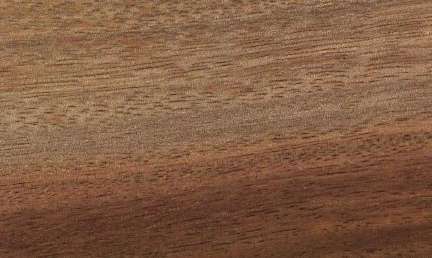
Akpa (Tetrapleura tetraptera)
Family: Leguminosae
Common names: Akpa, Akposso, Angular pod, Apapa, Aprekese, Aridan, Arido, Bubao, Budjo, Buleu, Ebuk, Edeminang, Esem, Ighimiakia, Ighirehimi, Igmikkia, Ikhememi, Ikoho, Imiminje, Ka-loma, Ka-segbel, Kokondu, Kokundui, Kyeke, Ossgosha, Prekese
Distributed in: Cameroon, Congo, Ivory Coast, Liberia, Senegal, Sudan, Uganda (Africa)
Distribution overview: The genus Tetrapleura consists of two species which occur in tropical Africa. T. tetraptera is widely distributed in tropical Africa, and is often found in secondary deciduous forests.
Common uses: Agricultural implements, Barge fenders, Bedroom suites, Boat building (general), Building materials, Cabinetmaking, Chairs, Chests, Clogs, Concealed parts (Furniture), Core Stock, Desks, Dining-room furniture, Docks, Dockwork, Domestic flooring, Dowell pins, Dowells, Drawer sides, Excelsior, Fine furniture, Floor lamps, Flooring, Furniture , Furniture components, Furniture squares or stock, Harbor work, Hatracks, Heavy construction, Interior construction, Interior trim, Joinery, Kitchen cabinets, Light construction, Living-room suites, Marine construction, Medicinal use, Millwork, Moldings, Naval architecture, Office furniture, Plywood, Posts, Shipbuilding, Turnery, Wheelwright work, Windows
Environment profile: Status has not been officially assessed
Tree size:
It is often unbuttressed, but may occasionally develop small, sharp buttresses.
Colors: the heart isReddish brown, Whiteand the sapwoodWhite, White to yellow.The grain isStraight, the textureMedium coarse to coarseand the lusterHigh
Natural durability: Susceptible to attack from powder post (Lyctid & Bostrychid) beetles, Susceptible to insect attack
Odor: No specific smell or taste
Drying Defects: May collapse and distort
Ease of Drying: Reconditioning Treatement
Tree Identification: Bole/stem form is buttressed
Blunting Effect: Moderate
Boring: Responds well to machine tools to produce clean bored surfaces
Carving: Good results
Cutting Resistance: Saws fairly well
Mortising: Fairly Easy to Very Easy
Moulding: Moulded surfaces tend to be clean
Movement in Service: Moulded surfaces tend to be clean
Nailing: Easy to nail
Planing: Responds well to ordinary machine tools in all operations
Resistance to Impregnation: Sapwood is moderately resistant
Resistance to Splitting: Poor
Response to hand tools: Responds well to ordinary hand tools in most operations
Routing recessing: Good routing qualities
Sanding: Yields relatively smooth surfaces
Turning: Yields fairly smooth surfaces
Polishing: Satisfactory;
- Numerical data Metric
- Numerical data English
- Strength properties
- References
 |
 |
 |
 |
| Item |
Green |
Dry |
Metric |
| Specific Gravity |
|
|
|
| Density |
|
576 |
kg/m3 |
| Bending Strength |
688 |
1057 |
kg/cm2 |
| Crushing Strength |
298 |
501 |
kg/cm2 |
| Hardness |
|
451 |
kg |
| Impact Strength |
|
|
cm |
| Shearing Strength |
|
130 |
kg/cm2 |
| Stiffness |
106 |
124 |
1000 kg/cm2 |
| Tangential Shrinkage |
|
|
% |
| Radial Shrinkage |
3 |
|
% |
| Weight |
560 |
448 |
kg/m3 |
| Maximum Load |
|
|
cm-kg/cm3 |
| Toughness |
|
|
cm-kg |
| Static Bending |
|
|
kg/cm2 |
|
 |  |  |  | | Item | Green | Dry | English | | Bending Strength | 9794 | 15046 | psi | | Density | | 36 | lbs/ft3 | | Hardness | | 995 | lbs | | Maximum Crushing Strength | 4248 | 7139 | psi | | Shearing Strength | | 1862 | psi | | Stiffness | 1519 | 1764 | 1000 psi | | Weight | 35 | 28 | lbs/ft3 | | Radial Shrinkage | 3 | | % | | Tangential Shrinkage | 7 | | % | |
Max. crushing strength = medium
Bending strength (MOR) = medium
Shrinkage, Radial = small
Density (dry weight) = 38-45 lbs/cu. ft.
Density (dry weight) = 31-37 lbs/cu. ft.
Shrinkage, Tangential = small
Shrinkage, Tangential = moderate
Shrinkage, Tangential = fairly large
Shrinkage, Radial = moderate
Hardness (side grain) = soft
Bending strength (MOR) = high
Density and most strength properties of the wood are reported to vary considerably. Fruits and seeds from the tree are reported to contain tannin which are used for flavoring and also for medicinal purposes.
Bolza, E., Keating, W.G.,1972,African Timbers - the Properties, Uses and Characteristics of 700 Species,C.S.I.R.O. Div. of Building ResearchEggeling, W.J.,1940,Indigenous Trees of Uganda,Govt. Printer Entebbe UgandaIrvine, F.R.,1961,Woody Plants of Ghana,O.U.P. LondonKeay, R.W.J.1989. Trees of Nigeria.Revised Version of Nigerian Trees. Clarendon Press, Oxford.Keay, R.W.J.,1964,Nigerian Trees Vol.2,Nigeria Federal Department of Forest Research, IbadanKryn, J.M., Forbes, E.W.,1959,The Woods of Liberia,U.S.A. Department of Agriculture,Forest Products Laboratory, Madison,,Report No. 2159Lebacq, L., Dechamps, R.,1967,Contribution a un Inventaire de Forets du Nord-kasai,Musee Royal de L'Afrique Centrale Belgium Annals Series 8 No.5Sallenave, P.,1955,Proprietes Phyiques et Mecaniques des Bois Tropicaux de l'Union Francaise,C.T.F.TSavill, P.S., Fox, J.E.D.,1967,Trees of Sierra LeoneTakahashi, A.,1978,Compilation of Data on the Mechanical Properties of Foreign Woods (Part,III) Africa,Shimane University, Japan, Research Report on Foreign Wood No. 7Unwin, A.H.,1920,West African Forests and Forestry,T. Fisher Unwin Ltd. London
|








